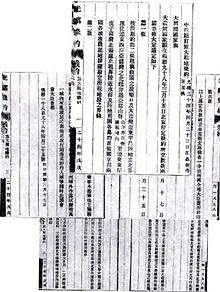Liaodong Peninsula Lease Agreement
The agreement on the lease of the Liaodong Peninsula ( Chinese 旅大 租 地 条约 , Pinyin lǚdà zūdì tiáoyuē ), also Lüda lease , signed on March 27, 1898 , is counted among the so-called unequal agreements because of its one-sided burdens for the defeated China . The treaty granted Russia colonial rights over the area around what is now Dalian, including the strategically important port of Lüshunkou (Port Arthur).
prehistory
In the First Sino-Japanese War in 1894/95, the area around the Liaodong peninsula was conquered by Japan. Taking advantage of China's weakened negotiating position, foreign colonial powers dictated a series of unilateral treaties. In the Shimonoseki Treaty , the peninsula was initially granted to Japan . However, the immense strengthening of Japan's position associated with the treaty soon called the governments of Russia , France and Germany, which were also active in China, to the scene. In the intervention of Shimonoseki in November 1895, they forced Japan to renounce the cession of the Liaodong Peninsula in return for an increase in war compensation to 230 million tael. Inspired by the Shimonoseki Treaty, however, the European governments themselves soon began to put pressure on China to push through their own annexation efforts. So Russia demanded to be able to lease the area including the strategically important Port Arthur from China.
On March 23, Alexander Pavlov on the one hand and Li Hongzhang on the other hand signed the lease agreement. The exact demarcation line was laid down in an additional protocol to the contract, which was signed on May 7, 1898 in St. Petersburg. This demanded further concessions from the Qing government with regard to Russia's rights.
content
The contract of March 27, 1898 essentially contains the following agreements:
- The Liaodong Peninsula in Manchuria and the adjacent coastal waters were leased to Russia for 25 years. A continuation of the contract should then be possible on the basis of mutual consent. The sovereign rights of the Emperor of China were preserved.
- The port of Port Arthur was converted into a closed military port that could only be approached by Russian or Chinese ships. The port of Dalian - with the exception of a smaller military restricted area - has been designated as a public international seaport.
- The construction and maintenance of military facilities as well as the lighthouses and sea markings required for the safety of shipping in the leased area were financially supported by Russia.
- Chinese armed forces were not allowed to enter the lease area.
- A demilitarized zone was set up north of Dalian. The Chinese government was responsible for civil administration in this neutral zone. Chinese troops were only allowed to enter this zone with the consent of Russia.
- In order to limit the loss of face to the Chinese government, it was agreed that while the military high command and civil administration of the area should be in the hands of one person, this person could not hold the title of "governor" or "governor general".
- Russia receives the concession to operate a railway line with which the leased area is to be connected to the Trans-Siberian Railway.
The following was regulated in the additional protocol of May 7, 1898 :
- Establishing the boundaries of the neutral area.
- Determination that Dalian and Port Arthur are the only two terminal stations on the link to the Trans-Siberian Railway.
- Determination that no competing rail concessions will be awarded to other powers in the course of the connection to the Trans-Siberian.
- The civil administration of Jinzhou (Kinchow) remains in Chinese hands. In return, the Chinese troops will be replaced by Russian soldiers.
- In the neutral area, no road and mining concessions and no trade or business privileges may be granted without the consent of Russia.
consequences
Japan did not agree to the lease agreement between Russia and China. This was one of the factors that led to the Russo-Japanese War of 1904/05. This war ended with the Treaty of Portsmouth , which awarded Japan Liaodong.
Others
The alternative name Lüda lease contract (English lüda land lease ) is a combination of the two first letters of " Lü shun" and " Da lian".



